Celebrating International Women’s Day
Authored by Leela Vosko
As we celebrate International Women’s Day, we assess global progress towards women’s financial inclusion and economic empowerment. Given MicroVest’s mission to provide access to responsible financial capital for underserved microentrepreneurs and small businesses, we want to take this opportunity to shine light on some of these realities and highlight examples of female entrepreneurship that gives us hope for the future.
The COVID-19 pandemic has dealt a setback to pre-pandemic trends favoring women’s financial inclusion. 740 million women worldwide work in the informal economy, and during the first month of the pandemic, their income fell 60%.1 Furthermore, the UN estimated that 47 million women and girls were pushed into extreme poverty since the pandemic started,2 partly due to female over-representation in sectors of the economy that have been hardest hit, namely service-oriented, consumer-facing businesses.
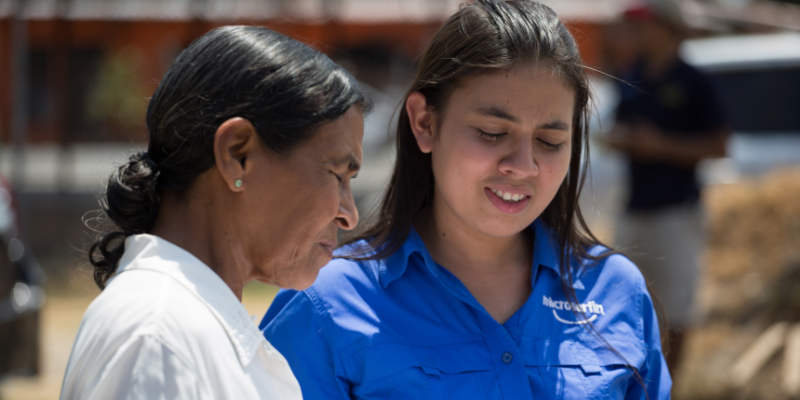
Women, particularly those in emerging markets, are often forced into entrepreneurship due to structural constraints that keep them from equal participation in the labor market of the formal economy. Yet, they continue to face difficulties with access to financing. Female-owned businesses comprised 23% of MSMEs worldwide, yet they accounted for 32% of the approximate $5 trillion MSME funding gap.3 Furthermore, women continue to be overrepresented among the world’s unbanked overall, accounting for more than half of the world’s 1.7 billion unbanked adults (56%).4
Given MicroVest’s mission of expanding access to finance at the bottom of the pyramid, we are constantly looking to support responsible microfinance and SME Financial Institutions whose lending activities will meaningfully increase women’s access to finance. We believe that factoring in a gender smart approach to portfolio underwriting ultimately shows up in key traditional measures of financial success like revenue growth and profitability. By investing in these institutions, MicroVest is seeking to responsibly support women who are providing valuable goods and services to their communities. When these women succeed, they have the capacity to generate employment for others and have greater resources to invest in the education, health and overall well-being of their own families.
As of June 30, 2021, more than five million of the 10.1 million microentrepreneurs and small businesses served by our portfolio companies were women.5 We are also proud that our portfolio is consistent with the G7 Development Finance Institutions (DFIs) 2X Challenge: Financing for Women criteria for Leadership and Consumption, with a portfolio share of female representation on senior management teams at above 20% and products or services benefiting women.
We would like to share some examples of inspiring women who have turned access to financial capital into thriving businesses:
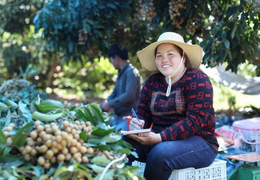
Oeurn Samon (Cambodia)
Ms. Samon owns and operates a longan farm and trading business in Pailin province, Cambodia. Learn about how she overcame early life challenges to build a successful trading business with self-taught skills in negotiations, distribution, wholesale partnerships, and logistics. Read more>
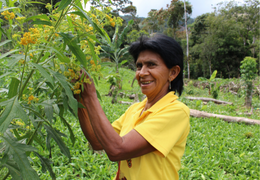
Gabriela Moran (Panama)
Ms. Moran owns three hectares of land in Peñas Blancas, Capira where she grows and cultivates a variety of crops like cilantro, mustard, chives, parsley, and coffee. To offset productivity losses from drought, she invested in an irrigation system to help maintain her crops during adverse weather events. Read more>
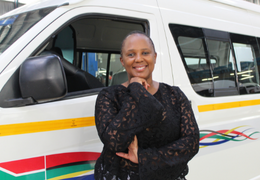
Grace Kelly Dlamini (South Africa)
Ms. Dlamini is a taxipreneur who owns and operates a four-vehicle taxi fleet in South Africa. While the taxi industry in South Africa continues to be disproportionately male-dominated, Ms. Dlamini has found ways to make her own mark as a woman in the industry. Read more>
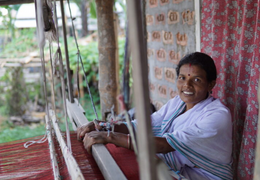
Kausalya Nayak (India)
Ms. Nayak resides in Rajpur village in northern India. After losing her husband seven years ago, she decided to use her training in weaving handloom clothes, which she received from the government, to start a small saree-making business. Read more>
2https://www.un.org/press/en/2021/sgsm20822.doc.htm
3SME Finance Forum, MSME Finance Gap https://www.smefinanceforum.org/data-sites/msme-finance-gap
4World Bank Global Findex (2017) https://globalfindex.worldbank.org/sites/globalfindex/files/chapters/2017%20Findex%20full%20report_chapter2.pdf
5The impact metrics listed here are portfolio level statistics across two of MicroVest’s flagship funds and are based on self-reported data by MicroVest’s portfolio companies as of 6/30/2021.
DISCLOSURE INFORMATION
The information contained here has been provided by MicroVest Capital Management LLC (“MicroVest”) and no representation or warranty, expressed or implied is made by MicroVest as to the accuracy or completeness of the information contained herein. Specific portfolio or pipeline companies discussed are for educational purposes only and do not represent all of the portfolio holdings and it should not be assumed that investments in the portfolio or pipeline company identified and discussed were or will be profitable. The companies profiled were selected based on their unique uses of technology in the context of social impact, with no reference to amount of profits or losses, realized or unrealized. This document is for informational purposes only and is neither an offer to sell nor a solicitation of an offer to purchase an interest in any MicroVest product (the “Funds”), and nothing herein should be construed as such. Any such offer or solicitation will be made only by means of delivery of a definitive private offering memorandum which contains a description of the significant risks involved in such an investment. Prospective investors should request a copy of the relevant Memorandum and review all offering materials carefully prior to making an investment. Any investment in a MicroVest product is speculative, involves a high degree of risk and is illiquid. An investor could lose all, a significant portion or some amount of its investment. You should not construe the contents of the enclosed materials as legal, tax, investment or other advice. To invest with MicroVest, one must be a qualified purchaser and an accredited investor. The investments may be deemed to be highly speculative investments and are not intended as a complete investment program. They are designed only for sophisticated persons who can bear the economic risk of the loss of their entire investment in the Funds and who have a limited need for liquidity in their investment. There can be no assurance that the Funds will achieve their investment objectives.